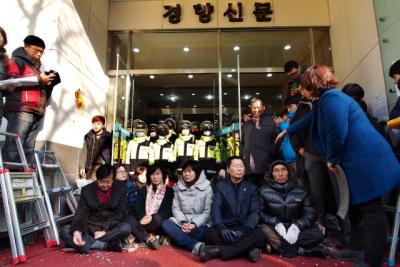South Korea: Rail workers strike against privatisation, general strike called

Railway workers' three-week strike against privatisation garnered wide support—and government repression. Photo by DDanzi Ilbo.
Britain: After the SWP -- a moment for revolutionary ambition

Former members of the SWP are discussing what's next?
Libya's continuing struggle for democracy

An anti-militia protester gunned down on November 15, 2013.
Venezuela and Chile: Election wins advance left agenda

Michele Bachelet won a resounding victory in the Chilean presidential race with 62% of the vote.
United States: Socialist councillor Kshama Sawant's inauguration speech
Democracy Now! interviewed Kshama Sawant on January 6, 2014, prior to her inauguration.
Britain: Looking back in anger -- the miners’ strike 30 years on

January 5, 2014 – Anticapitalist Initiative – With new papers released by the




